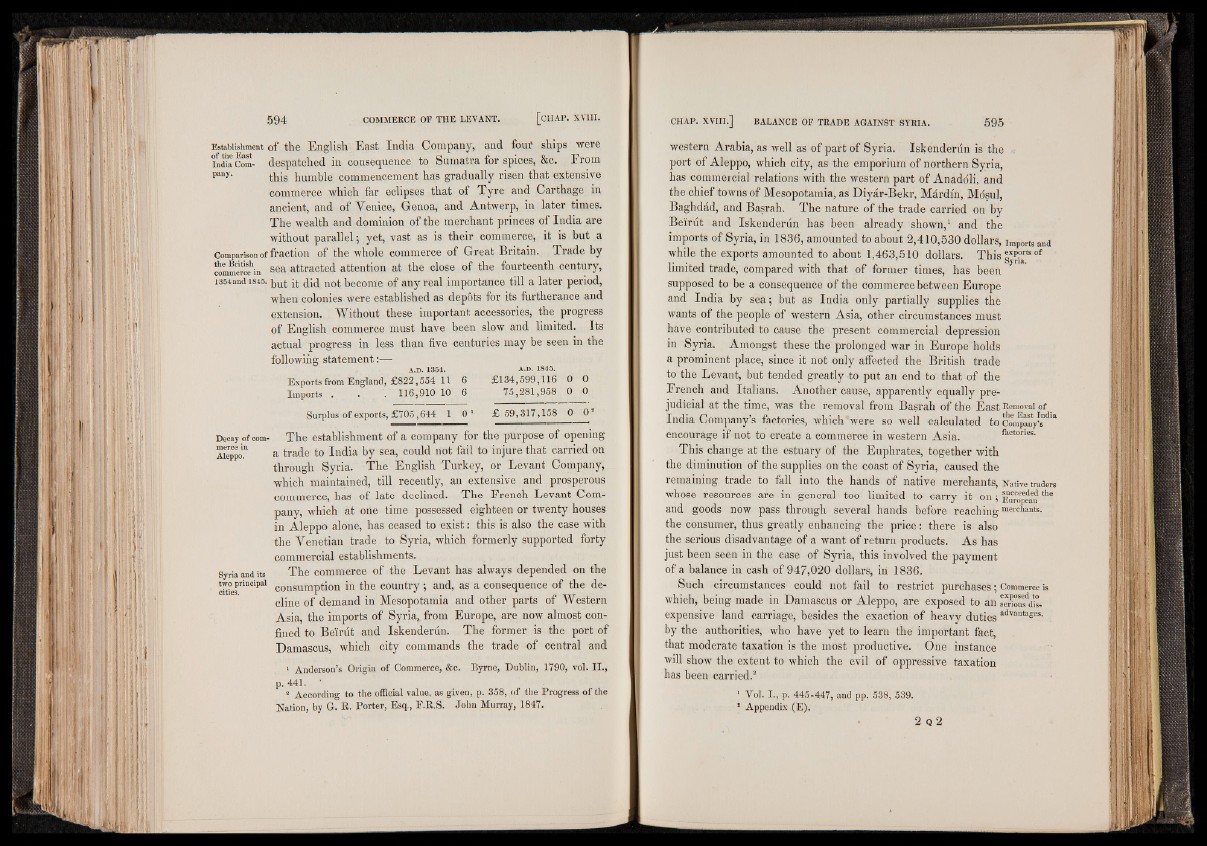
Establishment of the English East India Company, and four ships were
India Com- despatched in consequence to Sumatra for spices, &c. From
pany‘ this humble commencement has gradually risen that extensive
commerce which far eclipses that of Tyre and Carthage in
ancient, and of Venice, Genoa, and Antwerp, in later times.
The wealth and dominion of the merchant princes of India are
without parallel; yet, vast as is their commerce, it is but a
Comparison o f fraction of the whole commerce of Great Britain. Trade by
commet in sea attracted attention at the close of the fourteenth century,
1354and 1845. kut | | ¿¡q n0(; become of any real importance till a later period,
when colonies were established as dépôts for its furtherance and
extension. Without these important accessories, the progress
of English commerce must have been slow and limited. Its
actual progress in less than five centuries may be seen in the
following statement :—
A.D. 1354. A.D. 1845.
Exports from England, £822,554 11 6 £134,599,116 0 0
Imports . . . 116,910 10 6 75,281,958 0 0
Surplus of exports, £705,644 1 0 1 £ 59,317,158 0 0 2
Decay of com- Tli6 6sta.blisliîii6nt of 3, company for the purpose of opening
Aleppo.“ a trade to India by sea, could not fail to injure that carried on
through Syria. The English Turkey, or Levant Company,
which maintained, till recently, an extensive and prosperous
commerce, has of late declined. The French Levant Company,
which at one time possessed eighteen or twenty houses
in Aleppo alone, has ceased to exist : this is also the case with
the Venetian trade to Syria, which formerly supported forty
commercial establishments.
Syria and its The commerce of the Levant has always depended on the
SesPri“Cipal consumption in the country ; and, as a consequence of the decline
of demand in Mesopotamia and other parts of Western
Asia, the imports of Syria,, from Europe, are now almost confined
to Beirut and Iskenderun. The former is the port of
Damascus, which city commands the trade of central and
1 Anderson’s Origin of Commerce, &c. Byrne, Dublin, 1790, vol. II.,
p. 441.
« According to the official value, as given, p. 358, of the Progress of the
Nation, by G. R. Porter, Esq., F.R.S. John Murray, 1847.
western Arabia, as well as of part of Syria. Iskenderun is the
port of Aleppo, which city, as the emporium of northern Syria,
has commercial relations with the western part of Anadoli, and
the chief towns of Mesopotamia, as Diyar-Bekr, Mardin, Mosul,
Baghdad, and Basrah. The nature of the trade carried on by
Beirut and Iskenderun has been already shown,1 and the
imports of Syria, in 1836, amounted to about 2,410,530 dollars, imports and
while the exports amounted to about 1,463,510 dollars. This ®xp?rts of ■j. . , , . ’ Syria.
limited trade, compared with that of former times, has been
supposed to be a consequence of the commerce between Europe
and India by sea; but as India only partially supplies the
wants of the people of western Asia, other circumstances must
have contributed to cause the present commercial depression
in Syria. Amongst these the prolonged war in Europe holds
a prominent place, since it not only affected the British trade
to the Levant, but tended greatly to put an end to that of the
French and Italians. Another cause, apparently equally prejudicial
at the time, was the removal from Basrah of the East Removal of
India Company’s factories, which ’ were so well calculated to Company’s“ “
encourage if not to create a commerce in western Asia. factories.
This change at the estuary of the Euphrates, together with
the diminution of the supplies on the coast of Syria, caused the
remaining trade to fall into the hands of native merchants, Native traders
whose resources are in general too limited to carry it on ; European
and goods now pass through several hands before reachingmercllants-
the consumer, thus greatly enhancing the price: there is also
the serious disadvantage of a want of return products. As has
just been seen in the case of Syria, this involved the payment
of a balance in cash of 947,020 dollars, in 1836.
Such circumstances could not fail to restrict purchases; Commerce is
which, being made in Damascus or Aleppo, are exposed to an seriousdts-
expensive land carriage, besides the exaction of heavy duties advantases-
by the authorities, who have yet to learn the important fact,
that moderate taxation is the most productive. One instance
will show the extent to which the evil of oppressive taxation
has been carried.2
1 Vol. I., p. 445-447, and pp. 538, 539.
1 Appendix (E).
2 q 2